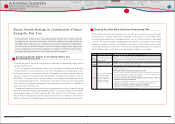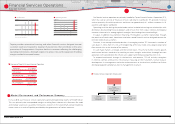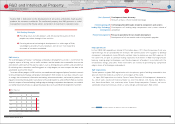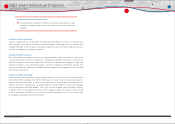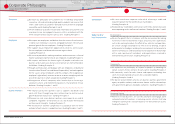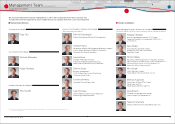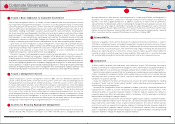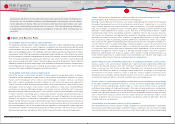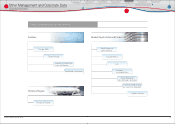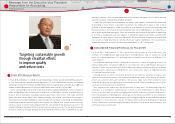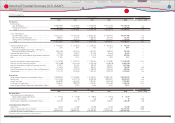Toyota 2010 Annual Report Download - page 26
Download and view the complete annual report
Please find page 26 of the 2010 Toyota annual report below. You can navigate through the pages in the report by either clicking on the pages listed below, or by using the keyword search tool below to find specific information within the annual report.
TOYOTA ANNUAL REPORT 2010 24
distinguished advisors from overseas with backgrounds in a wide range of fields, including politics,
economics, the environment, and business. Through the IAB, we receive advice on a diversity of
business issues from a global perspective. In addition, Toyota has a wide variety of conferences
and committees for deliberations and the monitoring of management and corporate activities that
reflect the views of a range of stakeholders, including the Labor-Management Council, the Joint
Labor-Management Round Table Conference, the Toyota Environment Committee, and the Stock
Option Committee. Moreover, Toyota established the CSR Committee by integrating the Corporate
Ethics Committee and the Corporate Philanthropy Committee in October 2007.
Toyota has engaged in timely and fair disclosure of corporate and nancial information as stated in
“CSR Policy: Contribution towards Sustainable Development.” In order to ensure the accuracy, fairness,
and timely disclosure of information, Toyota has established the Disclosure Committee chaired by
an officer of the Accounting Division. The Committee holds regular meetings for the purpose of
preparation, reporting and assessment of its annual securities report, quarterly report under the
Financial Instruments and Exchange Law of Japan and Form 20-F under the U.S. Securities Exchange
Act, and also holds extraordinary committee meetings from time to time whenever necessary.
To firmly establish corporate ethics and ensure strict compliance, Toyota’s CSR Committee, consisting of
Directors at the executive vice president level and above as well as representatives of Corporate Auditors, to
deliberate important issues and measures relating to corporate ethics, compliance and risk management.
Toyota has also created a number of facilities for employees to make inquiries concerning compliance
matters, including the Compliance Hotline, which enables them to consult with an outside attorney,
and takes measures to ensure that Toyota is aware of significant information concerning legal
compliance as quickly as possible.
Toyota will implement the tenets of ethical business practice by further promoting the “Guiding
Principles at Toyota” and the “Toyota Code of Conduct” and by educating and training employees at
all levels and in all areas of operations.
To monitor the management, Toyota has adopted an auditor system that is based on the Japanese
Corporation Act. In order to increase transparency of corporate activities, four of Toyota’s seven
Corporate Auditors are outside Corporate Auditors. Corporate Auditors support the Company’s
corporate governance eorts by undertaking audits in accordance with the audit policies and plans
determined by the Board of Corporate Auditors.
Toyota has secured the personnel and framework supporting the audit by Corporate Auditors.
The Outside Corporate Auditors advise Toyota from a fair and neutral perspective, based on their
broad experiences and insight in their respective field of expertise. The state of internal controls
and internal audit are reported to Corporate Auditors (including Outside Corporate Auditors)
through the Board of Corporate Auditors and the “CSR Committee”, and the status of accounting
audits is reported by independent External Auditors to the Corporate Auditors (including Outside
Corporate Auditors) through the Board of Corporate Auditors.
Accountability
Compliance
Toyota’s Basic Approach to Corporate Governance
Toyota’s Management System
Systems for Ensuring Appropriate Management
Toyota’s top management priority is to steadily increase corporate value over the long term. Further,
our fundamental management philosophy is to remain a trusted corporate citizen in international
society through open and fair business activities that honor the language and spirit of the law of every
nation. In order to put that philosophy into practice, Toyota builds favorable relationships with all of its
stakeholders, including shareholders, customers, business partners, local communities, and employees.
We are convinced that providing products that fully cater to customer needs is essential to achieve stable,
long-term growth. That philosophy is outlined in the “Guiding Principles at Toyota.” Further, to explain
those principles in more detailed terms, we prepared and issued the “Contribution towards Sustainable
Development” statement in January 2005. Through such initiatives, Toyota is taking concrete measures to
reinforce its corporate governance functions and to become an even more competitive global company.
Specifically, we have introduced a unique management system focused on prompt decision
making for developing our global strategy and speeding up operations. Furthermore, we have a
range of long-standing in-house committees and councils responsible for monitoring and discussing
management and corporate activities from the viewpoints of various stakeholders to ensure
heightened transparency and the fulllment of social obligations.
Ultimately, however, a well-developed awareness of ethics among individuals is the key to successful
governance systems. Without such awareness—regardless of the governance structure of a company—
corporate governance cannot function eectively. Toyota has a unique corporate culture that places emphasis
on problem solving and preventative measures, such as problem solving based on the actual situation on
the site and highlighting problems by immediately flagging and sharing them. In other words, because
Toyota’s approach is to build in quality through manufacturing processes, enhancing the quality of everyday
operations strengthens governance. Toyota’s management team and employees conduct operations and
make decisions founded on that common system of checks and balances and on high ethical standards.
Toyota introduced its current management system in 2003. The main differences between the
current system and the former system are that the current system set a new non-board position of
Managing Officers and reduced the number of directors. Under the current system, with respect
to various operational functions across the entire Company, in principle the Senior Managing
Directors, who are Directors, serve as the highest authorities of their specific operational functions
while non-board Managing Officers implement the actual operations. The distinctive feature of
this system is that, based on Toyota’s philosophy of emphasizing developments on the site, the
Senior Managing Directors serve as the link between management and on-site operations, instead
of focusing exclusively on management. As a result, this system enables the management to make
decisions directly with on-site operations by reflecting on-site personnel opinions on management
strategy and swiftly implementing management decisions into actual operations.
As a system to ensure appropriate management, Toyota has convened meetings of its International
Advisory Board (IAB) annually in principle since 1996. The IAB consists of approximately 10
Corporate Governance
Corporate Information
Risk Factors Other Management and Corporate Data
Consolidated
Performance Highlights
Financial Section
Investor Information
Corporate Information
Business Overview
Special Feature
Top Messages
Corporate PhilosophyR&D and Intellectual Property Management Team Corporate Governance


